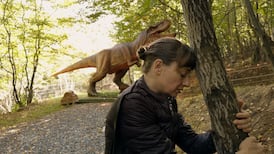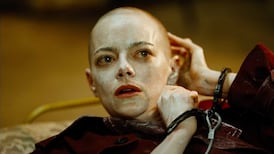There exist silly people who, thousands of years after the Greeks showed otherwise, feel it inappropriate for comedies to engage with the most harrowing issues. A more moderate wing accepts such engagement is possible, but only in comedies that don’t dare to be properly funny.
Eva Victor’s near-perfect debut offers the most satisfactory rebuttal imaginable. Justly famous for hilarious online videos, the Californian multihyphenate here gives us a variation on the campus comedies that so interested writers in the postwar years.
The director stars as Agnes, a lecturer still working in the same groves of academe that granted her a postgraduate degree. In what counts as the film’s present, she welcomes Lydie (the always nimble Naomi Ackie) for a visit and rejoices in the news that her old pal is pregnant. But something is not quite right with our protagonist. As the film jags back and forth from past to present, we learn that, a few years earlier, a senior lecturer sexually assaulted her.
That incident is handled with restraint. We see her entering the man’s house. We later see her leaving in distress. Gradually a few specific details emerge. Eva Victor the actor gets across the stickiness of the trauma with great subtlety, while Eva Victor the film-maker, in a kind of tonal miracle, manages to generate laughs even in the close aftermath of the attacks. “We know what you’re going through. We are women,” unhelpful college advisers tell her. Victor’s “What?” is a masterpiece of monosyllabic deadpan.
READ MORE
The film’s treatment of such low-level antagonists is one of its great strengths. ER Fightmaster as Fran, Lydie’s partner, is just priggish enough to suggest that Agnes will, for the rest of her life, be suppressing a desire to roll her eyes in the couple’s presence. Fran doesn’t get the old friends’ jokes and will always resent the pair for making them.
Better still is Kelly McCormack as a grating competitor for the lectureship that Agnes eventually secures (and a some-time partner of her assailant). Is she really such a pain or are we just seeing her through Agnes’s irritated eyes?
The economy of these humorous portraits must surely owe something to Victor’s background in online vignettes. Each new generation comes to the medium with lessons learned from their own era’s formats and technologies.
There are no morals here, but Sorry, Baby does, at least, make the argument that every person should be allowed to process trauma in their own fashion. In the current case that is wound up with a need to get on with the activities that previously made life liveable.
The film often forgets about the attack – even if the protagonist does not – but, when it acknowledges those unhappy memories, it usually finds someone to offer comfort. Lucas Hedges is charming as a near neighbour who is almost as befuddled by life as Agatha. The perennially engaging John Carroll Lynch has a believable cameo as a deli owner whose gift of a sandwich is not as important as his willingness to offer a patient ear.
Here we have an unmistakable effusion of the contemporary boho set that delights in poking fun at that cadre’s pretensions and delusions. It likes almost all of its characters and, the attacker aside, extracts enormous humour from those it abhors. Sorry, Baby, winner of the Waldo Salt screenwriting award at Sundance Film Festival, is ultimately an optimistic film. And you don’t get too many of those these days from the independent sector.
“There’s a reason, even if I can’t see it, that I’m alive,” Agatha says late into the movie. Well put. Pay attention. One good reason we all have to remain upright is this clever, original, warm cinematic balm.
In cinemas from Friday, August 22nd














